Luciano Emmer 100: The Art of Gazing is one of the programmes we follow at Il Cinema Ritrovato 2018. Placed chronologically after Neorealism and before Commedia all’italiana, director Emmer’s works occupy a space of their own and possess great attention to detail and ambience. He was the voice of young Roman characters and social groups in transition at the threshold of modernity, and Emmer made several inventive and original films that helped redefine the aesthetic tenets of Italian cinema. In his Le ragazze di Piazza di Spagna (1952), one of the three Roman Girls from the title was played by Cosetta Greco (1930-2002). This Italian film actress appeared in 31 films between 1943 and 1971.

French postcard by Editions P.I., licence holder for Ufa, Berlin-Tempelhof, no. FK 1216. Photo: Dial / Unitalia Film, Rom (Rome).
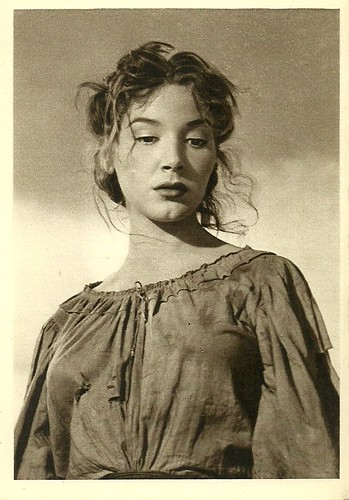
Italian postcard. Photo: LIF, Rotocalco Dagnino, Torino. Cosetta Greco in Il Brigante di Tacca del Lupo (Pietro Germi, 1952), based on the novel by Riccardo Bacchelli. Publicity card for the Manzoni cinema, Turin, where the film ran from 21 November [1952] onwards.

Italian postcard by Bromofoto, Milano, no. 881. Photo: Dear Film.
Cosetta Greco was born as Cesarina Rossi in Trento, Italy in 1930. As a teenager, she took part in a competition for new actors by Scalera Film. Credited as Cesarina Rossi, she made her debut in the cinema with a small part as a chambermaid in Addio, amore!/Farewell, love! (Gianni Franciolini, 1943) starring Jacqueline Laurent and Clara Calamai.
Still credited as Cesarina Rossi, Greco played a young nun in the comedy La sposa non può attendere/The Bride Can't Wait (Gianni Franciolini, 1949), starring Gino Cervi and Gina Lollobrigida. In 1951, she was chosen by director Pietro Germi for a major part in the crime film La città si difende/Four Ways Out (Pietro Germi, 1951), starring Gina Lollobrigida. Greco played the wife of one of four inexperienced criminals, who rob a stadium ticket booth during a big soccer game and then split up to try to hide separately.
The film follows their efforts to evade the police, complicated by the fact they are not professional criminals. La città si difende, co-written by Federico Fellini, won the award for Best Italian Film at the Venice International Film Festival in 1951.
The following year, she played the female lead in Germi's historical film Il brigante di Tacca del Lupo/The Bandit of Tacca Del Lupo (Pietro Germi, 1952). In 19th-century southern Italy, a small force of soldiers led by Captain Giordani (Amedeo Nazzari) fought in the hills against the bandits who were holding their country to ransom. The film was co-written by Federico Fellini, Germi and Tullio Pinelli.
Then she starred with Lucia Bosé and Liliana Bonfatti as three beautiful Roman seamstresses from one of the fashionable dress salons near the Piazza de Spagna in the classic comedy Le ragazze di piazza di Spagna/Three Girls from Rome (Luciano Emmer, 1952). The girls gather on the steps of the Piazza de Spagna to eat lunch and talk about their boyfriends, including Renato Salvatori and Marcello Mastroianni.
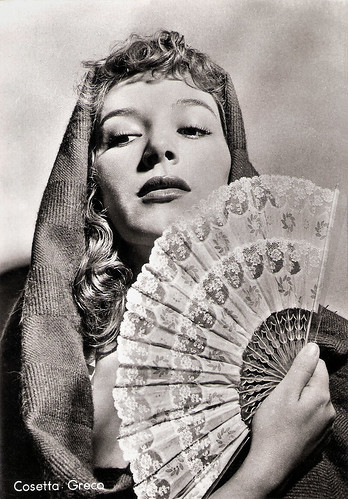
Italian postcard by Bromostampa, Milano, no. 234. Photo: Dear Film.
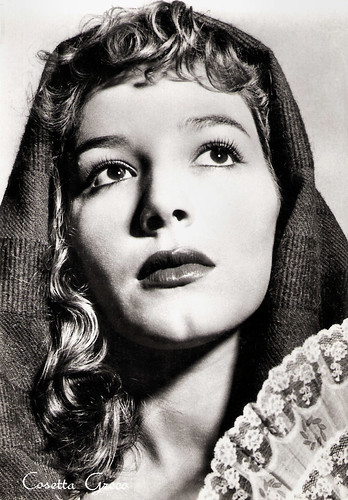
Italian postcard by Rotalfoto, Milano, no. 239.
Cosetta Greco played a supporting part in the melodrama La Nemica/The Enemy (Giorgio Bianchi, 1952), starring Elisa Cegani, and that same year she co-starred with French actor Henri Vidal in Art. 519 codice penale/Article 519, Penal Code (Leonardo Cortese, 1952).
Another success was the soccer drama Gli eroi della domenica/Sunday Heroes (Mario Camerini, 1953), in which she played the only major female character between Raf Vallone, Marcello Mastroianni, Paolo Stoppa and Franco Interlenghi.
That year she also played the former wife of prisoner Daniel Gélin in the French-Italian drama La maison du silence/Voice of Silence (Georg Wilhelm Pabst, 1953), starring Aldo Fabrizi and Jean Marais. Her last major success was Cronache di poveri amanti/Chronicle of Poor Lovers (Carlo Lizzani, 1954), in which she played cynical prostitute Elisa. She co-starred with Anna-Maria Ferrero, Antonella Lualdi and again Marcello Mastroianni. This drama was entered into the 1954 Cannes Film Festival.
Greco had a small part in the drama Gli innamorati/Wild Love (Mauro Bolognini, 1955), featuring real-life couple Antonella Lualdi and Franco Interlenghi. It was entered into the 1956 Cannes Film Festival. In 1955, Greco also appeared in the Eddie Constantine crime film Je suis un sentimental/Headlines of Destruction (John Berry, 1955) and she was among the all-star cast of Napoléon (Sacha Guitry, 1955). She later appeared in the romantic drama I sogni nel cassetto/Dreams in a Drawer (Renato Castellani, 1957) starring Lea Massari.
Cosetta Greco was also active on television. In 1959, she appeared in the TV mini-series Il romanzo di un maestro/The Novel of a Master (Mario Landi, 1959). During the 1960s, she played Mata Hari in the TV mini-series Dossier Mata Hari (Mario Landi, 1967), opposite Gabriele Ferzetti. Her last feature film was the Spaghetti Western Lo sceriffo di Rockspring/Sheriff of Rock Springs (Mario Sabatini, 1971) with Richard Harrison. Cosetta Greco passed away in Rome in 2002. She was 71. She was married to Mario Cimica.
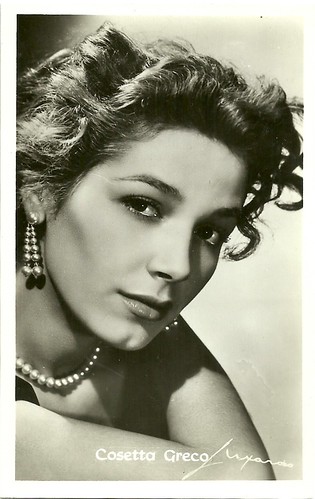
Italian photocard. Photo Luxardo.
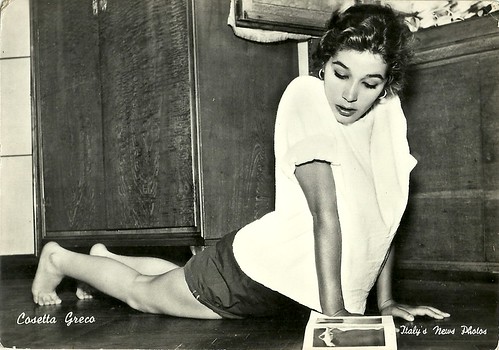
Italian postcard by Bromofoto, Milano, no. 1210.
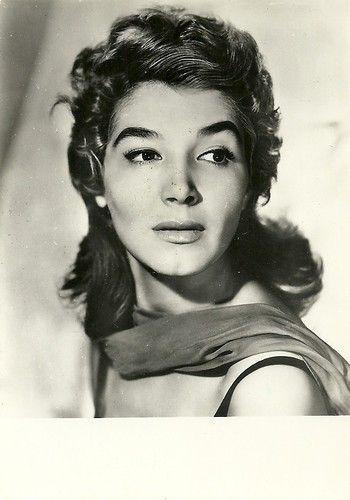
Italian postcard by Bromostampa, Milano in the Series 'Hobby'. This card could be posted to the star, asking to be returned with an autograph.
Sources: Wikipedia (Italian and English) and IMDb.
This post was last updated on 11 July 2024.

French postcard by Editions P.I., licence holder for Ufa, Berlin-Tempelhof, no. FK 1216. Photo: Dial / Unitalia Film, Rom (Rome).

Italian postcard. Photo: LIF, Rotocalco Dagnino, Torino. Cosetta Greco in Il Brigante di Tacca del Lupo (Pietro Germi, 1952), based on the novel by Riccardo Bacchelli. Publicity card for the Manzoni cinema, Turin, where the film ran from 21 November [1952] onwards.

Italian postcard by Bromofoto, Milano, no. 881. Photo: Dear Film.
The love life of three beautiful Roman seamstresses
Cosetta Greco was born as Cesarina Rossi in Trento, Italy in 1930. As a teenager, she took part in a competition for new actors by Scalera Film. Credited as Cesarina Rossi, she made her debut in the cinema with a small part as a chambermaid in Addio, amore!/Farewell, love! (Gianni Franciolini, 1943) starring Jacqueline Laurent and Clara Calamai.
Still credited as Cesarina Rossi, Greco played a young nun in the comedy La sposa non può attendere/The Bride Can't Wait (Gianni Franciolini, 1949), starring Gino Cervi and Gina Lollobrigida. In 1951, she was chosen by director Pietro Germi for a major part in the crime film La città si difende/Four Ways Out (Pietro Germi, 1951), starring Gina Lollobrigida. Greco played the wife of one of four inexperienced criminals, who rob a stadium ticket booth during a big soccer game and then split up to try to hide separately.
The film follows their efforts to evade the police, complicated by the fact they are not professional criminals. La città si difende, co-written by Federico Fellini, won the award for Best Italian Film at the Venice International Film Festival in 1951.
The following year, she played the female lead in Germi's historical film Il brigante di Tacca del Lupo/The Bandit of Tacca Del Lupo (Pietro Germi, 1952). In 19th-century southern Italy, a small force of soldiers led by Captain Giordani (Amedeo Nazzari) fought in the hills against the bandits who were holding their country to ransom. The film was co-written by Federico Fellini, Germi and Tullio Pinelli.
Then she starred with Lucia Bosé and Liliana Bonfatti as three beautiful Roman seamstresses from one of the fashionable dress salons near the Piazza de Spagna in the classic comedy Le ragazze di piazza di Spagna/Three Girls from Rome (Luciano Emmer, 1952). The girls gather on the steps of the Piazza de Spagna to eat lunch and talk about their boyfriends, including Renato Salvatori and Marcello Mastroianni.

Italian postcard by Bromostampa, Milano, no. 234. Photo: Dear Film.

Italian postcard by Rotalfoto, Milano, no. 239.
Chronicle of a cynical prostitute
Cosetta Greco played a supporting part in the melodrama La Nemica/The Enemy (Giorgio Bianchi, 1952), starring Elisa Cegani, and that same year she co-starred with French actor Henri Vidal in Art. 519 codice penale/Article 519, Penal Code (Leonardo Cortese, 1952).
Another success was the soccer drama Gli eroi della domenica/Sunday Heroes (Mario Camerini, 1953), in which she played the only major female character between Raf Vallone, Marcello Mastroianni, Paolo Stoppa and Franco Interlenghi.
That year she also played the former wife of prisoner Daniel Gélin in the French-Italian drama La maison du silence/Voice of Silence (Georg Wilhelm Pabst, 1953), starring Aldo Fabrizi and Jean Marais. Her last major success was Cronache di poveri amanti/Chronicle of Poor Lovers (Carlo Lizzani, 1954), in which she played cynical prostitute Elisa. She co-starred with Anna-Maria Ferrero, Antonella Lualdi and again Marcello Mastroianni. This drama was entered into the 1954 Cannes Film Festival.
Greco had a small part in the drama Gli innamorati/Wild Love (Mauro Bolognini, 1955), featuring real-life couple Antonella Lualdi and Franco Interlenghi. It was entered into the 1956 Cannes Film Festival. In 1955, Greco also appeared in the Eddie Constantine crime film Je suis un sentimental/Headlines of Destruction (John Berry, 1955) and she was among the all-star cast of Napoléon (Sacha Guitry, 1955). She later appeared in the romantic drama I sogni nel cassetto/Dreams in a Drawer (Renato Castellani, 1957) starring Lea Massari.
Cosetta Greco was also active on television. In 1959, she appeared in the TV mini-series Il romanzo di un maestro/The Novel of a Master (Mario Landi, 1959). During the 1960s, she played Mata Hari in the TV mini-series Dossier Mata Hari (Mario Landi, 1967), opposite Gabriele Ferzetti. Her last feature film was the Spaghetti Western Lo sceriffo di Rockspring/Sheriff of Rock Springs (Mario Sabatini, 1971) with Richard Harrison. Cosetta Greco passed away in Rome in 2002. She was 71. She was married to Mario Cimica.

Italian photocard. Photo Luxardo.

Italian postcard by Bromofoto, Milano, no. 1210.

Italian postcard by Bromostampa, Milano in the Series 'Hobby'. This card could be posted to the star, asking to be returned with an autograph.
Sources: Wikipedia (Italian and English) and IMDb.
This post was last updated on 11 July 2024.
No comments:
Post a Comment